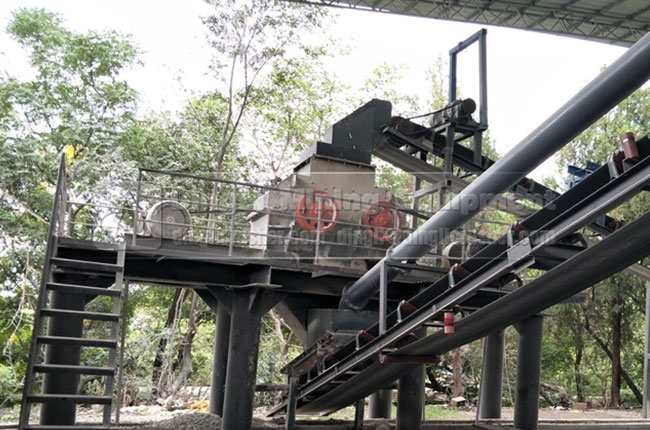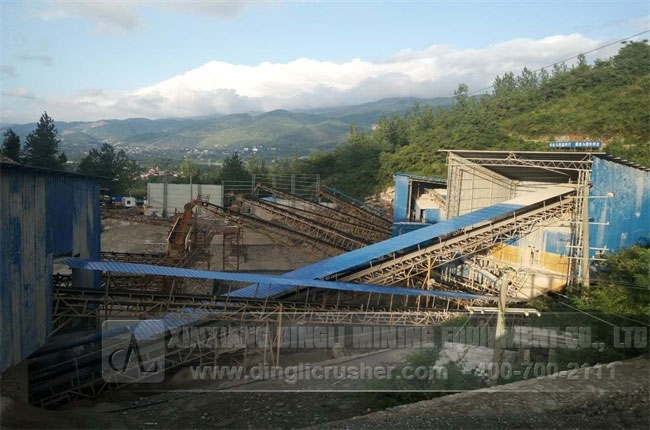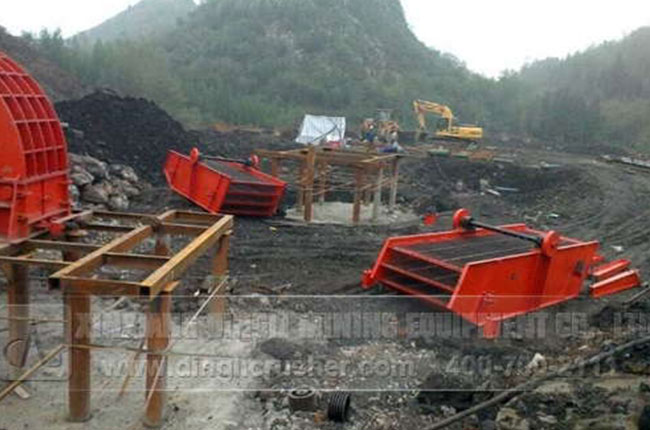 Sand Aggregate IndustryComprehensive Service Provider
Sand Aggregate IndustryComprehensive Service Provider Sand Aggregate IndustryComprehensive Service Provider
Sand Aggregate IndustryComprehensive Service Provider| Model | XJS400 | ||||
| Crushing Chamber Type | Extra Coarse (BC) | Coarse (C) | Medium (M) | Fine (F) | Extra Fine (EF) |
| Standard Type Feeding Hole Size (mm) | 295 | 250 | 195 | 110 | |
| Standard Type Minimum Discharging Hole Size (mm) | 30 | 25 | 20 | 14 | |
| Short Head Feeding Hole Size (mm) | 90 | 50 | 40 | 30 | |
| Short Head Minimum Discharging Size (mm) | 10 | 8 | 6 | 6 | |
| Power (kW) | 280 - 355 | ||||
| Production Capacity (t/h) | 140 - 630 | ||||
*Note: The processing capacity of the XJS400 cone crusher may vary with different materials and feeding sizes.

50TPH Sand Production Line Layout Main Equipment Name Model Power(kw) Set Dual Rotor sand Maker ZSJ0808 2*55kw 1 Vitrating Screen 3YKZ2060 30kw 1 Sand Production Process After processing of primary crusher the crushed limestone is conveyed

The Southwest China keeps as one of our main markets in China due to its special landscape. Against the backdrop that China tightens national environmental protection policy year by year.

Airplane Construction in Liu Panshui Guizhou chose 300tph aggregates production line. From the picture we get to know it chooses four mineral equipment of PCZ1512 heavy hammer crusher vibrating feeder and two efficient vibrating screens.
Welcome to use the XJS400 cone crusher. This manual will introduce in detail the characteristics, application ranges, operation methods, maintenance points and other information of different cavity types of this crusher to help you use and maintain the equipment correctly and obtain the best crushing effect and economic benefits.
The XJS400 cone crusher is an efficient crushing equipment with a variety of crushing cavity types to choose from, which can meet different crushing needs. It mainly consists of a frame, a transmission device, a crushing cavity, an adjustment device, a lubrication system, a hydraulic system and other parts.
Ultra-Coarse (BC) Cavity Type: Feed opening 295mm, maximum feed 30mm. Used for primary crushing in large mines, such as open-pit copper mines. Check for foreign objects and startup sequence before startup. Regularly check for wear, lubrication and hydraulic system.
Coarse (C) Cavity Type: Feed opening 250mm, maximum feed 25mm, minimum discharge 10mm. Applied to building stone production and secondary crushing in medium-sized mines. Pay attention to parameters, discharge port adjustment and stable feeding during operation. Pay attention to wearing parts, transmission and cleaning during maintenance.
Medium (M) Cavity Type: Feed opening 195mm, maximum feed 20mm, minimum discharge 8mm. Used for concrete aggregate and fine processing of building materials. Check components, adjust parameters and pay attention to vibration during operation. Check cavity cleaning, lubrication and adjustment device during maintenance.
Fine (F) Cavity Type: Feed opening 110mm, maximum feed 14mm, minimum discharge 6mm. Used for high-quality construction sand and asphalt mixture production. Start with no load, control feed particle size and check product particle size. Maintain wearing parts, discharge and system maintenance.
Ultra-Fine (EF) Cavity Type: Maximum feed 6mm. Used for high-end building materials and fine chemical raw material production. Precisely control feed and discharge during operation, start and stop slowly and pay attention to quality. Maintain fine cleaning, use high-quality oil and check sealing.
1. Operators must receive professional training and be familiar with the operation process and safety precautions of the equipment.
2. When the equipment is running, it is strictly prohibited to open any protective device of the crusher to prevent danger.
3. Regularly conduct safety inspections on the equipment, including the electrical system, mechanical parts, etc., to ensure the safe and reliable operation of the equipment.
4. When maintaining and repairing the equipment, the power supply must be cut off and a warning sign must be hung to prevent misoperation.
1. The equipment cannot start: Check whether the power supply is connected, whether the motor is faulty, and whether the pressure of the lubrication system and the hydraulic system is normal.
2. The product particle size does not meet the requirements: Check whether the size of the discharge port is appropriate, whether the feed speed is uniform, and whether the internal parts of the crushing cavity are severely worn.
3. The equipment vibrates abnormally: Check whether the foundation of the equipment is firm, whether the moving cone and the fixed cone are worn unevenly, and whether the transmission device is faulty.
Correctly using and maintaining different cavity types of the XJS400 cone crusher can improve the service life and production efficiency of the equipment and bring greater benefits to your production and operation. If you have any questions or need technical support, please feel free to contact our after-sales service team.
We are present worldwide and always here to help.
Get in touch today!